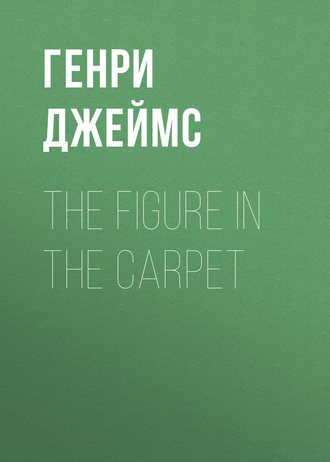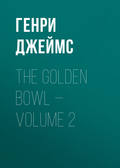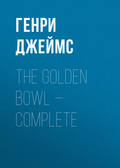
Генри Джеймс
The Figure in the Carpet
CHAPTER X
Six months later appeared “The Right of Way,” the last chance, though we didn’t know it, that we were to have to redeem ourselves. Written wholly during Vereker’s sojourn abroad, the book had been heralded, in a hundred paragraphs, by the usual ineptitudes. I carried it, as early a copy as any, I this time flattered myself, straightway to Mrs. Corvick. This was the only use I had for it; I left the inevitable tribute of The Middle to some more ingenious mind and some less irritated temper. “But I already have it,” Gwendolen said. “Drayton Deane was so good as to bring it to me yesterday, and I’ve just finished it.”
“Yesterday? How did he get it so soon?”
“He gets everything so soon! He’s to review it in The Middle.”
“He—Drayton Deane—review Vereker?” I couldn’t believe my ears.
“’Why not? One fine ignorance is as good as another.”
I winced but I presently said: “You ought to review him yourself!”
“I don’t ‘review,’” she laughed. “I’m reviewed!”
Just then the door was thrown open. “Ah yes, here’s your reviewer!” Drayton Deane was there with his long legs and his tall forehead: he had come to see what she thought of “The Right of Way,” and to bring news that was singularly relevant. The evening papers were just out with a telegram on the author of that work, who, in Rome, had been ill for some days with an attack of malarial fever. It had at first not been thought grave, but had taken, in consequence of complications, a turn that might give rise to anxiety. Anxiety had indeed at the latest hour begun to be felt.
I was struck in the presence of these tidings with the fundamental detachment that Mrs. Corvick’s overt concern quite failed to hide: it gave me the measure of her consummate independence. That independence rested on her knowledge, the knowledge which nothing now could destroy and which nothing could make different. The figure in the carpet might take on another twist or two, but the sentence had virtually been written. The writer might go down to his grave: she was the person in the world to whom—as if she had been his favoured heir—his continued existence was least of a need. This reminded me how I had observed at a particular moment—after Corvick’s death—the drop of her desire to see him face to face. She had got what she wanted without that. I had been sure that if she hadn’t got it she wouldn’t have been restrained from the endeavour to sound him personally by those superior reflexions, more conceivable on a man’s part than on a woman’s, which in my case had served an a deterrent. It wasn’t however, I hasten to add, that my case, in spite of this invidious comparison, wasn’t ambiguous enough. At the thought that Vereker was perhaps at that moment dying there rolled over me a wave of anguish—a poignant sense of how inconsistently I still depended on him. A delicacy that it was my one compensation to suffer to rule me had left the Alps and the Apennines between us, but the sense of the waning occasion suggested that I might in my despair at last have gone to him. Of course I should really have done nothing of the sort. I remained five minutes, while my companions talked of the new book, and when Drayton Deane appealed to me for my opinion of it I made answer, getting up, that I detested Hugh Vereker and simply couldn’t read him. I departed with the moral certainty that as the door closed behind me Deane would brand me for awfully superficial. His hostess wouldn’t contradict that at least.
I continue to trace with a briefer touch our intensely odd successions. Three weeks after this came Vereker’s death, and before the year was out the death of his wife. That poor lady I had never seen, but I had had a futile theory that, should she survive him long enough to be decorously accessible, I might approach her with the feeble flicker of my plea. Did she know and if she knew would she speak? It was much to be presumed that for more reasons than one she would have nothing to say; but when she passed out of all reach I felt renannouncement indeed my appointed lot. I was shut up in my obsession for ever—my gaolers had gone off with the key. I find myself quite as vague as a captive in a dungeon about the tinge that further elapsed before Mrs. Corvick became the wife of Drayton Deane. I had foreseen, through my bars, this end of the business, though there was no indecent haste and our friendship had fallen rather off. They were both so “awfully intellectual” that it struck people as a suitable match, but I had measured better than any one the wealth of understanding the bride would contribute to the union. Never, for a marriage in literary circles—so the newspapers described the alliance—had a lady been so bravely dowered. I began with due promptness to look for the fruit of the affair—that fruit, I mean, of which the premonitory symptoms would be peculiarly visible in the husband. Taking for granted the splendour of the other party’s nuptial gift, I expected to see him make a show commensurate with his increase of means. I knew what his means had been—his article on “The Right of Way” had distinctly given one the figure. As he was now exactly in the position in which still more exactly I was not I watched from month to month, in the likely periodicals, for the heavy message poor Corvick had been unable to deliver and the responsibility of which would have fallen on his successor. The widow and wife would have broken by the rekindled hearth the silence that only a widow and wife might break, and Deane would be as aflame with the knowledge as Corvick in his own hour, as Gwendolen in hers, had been. Well, he was aflame doubtless, but the fire was apparently not to become a public blaze. I scanned the periodicals in vain: Drayton Deane filled them with exuberant pages, but he withheld the page I most feverishly sought. He wrote on a thousand subjects, but never on the subject of Vereker. His special line was to tell truths that other people either “funked,” as he said, or overlooked, but he never told the only truth that seemed to me in these days to signify. I met the couple in those literary circles referred to in the papers: I have sufficiently intimated that it was only in such circles we were all constructed to revolve. Gwendolen was more than ever committed to them by the publication of her third novel, and I myself definitely classed by holding the opinion that this work was inferior to its immediate predecessor. Was it worse because she had been keeping worse company? If her secret was, as she had told me, her life—a fact discernible in her increasing bloom, an air of conscious privilege that, cleverly corrected by pretty charities, gave distinction to her appearance—it had yet not a direct influence on her work. That only made one—everything only made one—yearn the more for it; only rounded it off with a mystery finer and subtler.
CHAPTER XI
It was therefore from her husband I could never remove my eyes: I beset him in a manner that might have made him uneasy. I went even so far as to engage him in conversation. Didn’t he know, hadn’t he come into it as a matter of course?—that question hummed in my brain. Of course he knew; otherwise he wouldn’t return my stare so queerly. His wife had told him what I wanted and he was amiably amused at my impotence. He didn’t laugh—he wasn’t a laugher: his system was to present to my irritation, so that I should crudely expose myself, a conversational blank as vast as his big bare brow. It always happened that I turned away with a settled conviction from these unpeopled expanses, which seemed to complete each other geographically and to symbolise together Drayton Deane’s want of voice, want of form. He simply hadn’t the art to use what he knew; he literally was incompetent to take up the duty where Corvick had left it. I went still further—it was the only glimpse of happiness I had. I made up my mind that the duty didn’t appeal to him. He wasn’t interested, he didn’t care. Yes, it quite comforted me to believe him too stupid to have joy of the thing I lacked. He was as stupid after as he had been before, and that deepened for me the golden glory in which the mystery was wrapped. I had of course none the less to recollect that his wife might have imposed her conditions and exactions. I had above all to remind myself that with Vereker’s death the major incentive dropped. He was still there to be honoured by what might be done—he was no longer there to give it his sanction. Who alas but he had the authority?
Two children were born to the pair, but the second cost the mother her life. After this stroke I seemed to see another ghost of a chance. I jumped at it in thought, but I waited a certain time for manners, and at last my opportunity arrived in a remunerative way. His wife had been dead a year when I met Drayton Deane in the smoking-room of a small club of which we both were members, but where for months—perhaps because I rarely entered it—I hadn’t seen him. The room was empty and the occasion propitious. I deliberately offered him, to have done with the matter for ever, that advantage for which I felt he had long been looking.
“As an older acquaintance of your late wife’s than even you were,” I began, “you must let me say to you something I have on my mind. I shall be glad to make any terms with you that you see fit to name for the information she must have had from George Corvick—the information you know, that had come to him, poor chap, in one of the happiest hours of his life, straight from Hugh Vereker.”
He looked at me like a dim phrenological bust. “The information—?”
“Vereker’s secret, my dear man—the general intention of his books: the string the pearls were strung on, the buried treasure, the figure in the carpet.”
He began to flush—the numbers on his bumps to come out. “Vereker’s books had a general intention?”
I stared in my turn. “You don’t mean to say you don’t know it?” I thought for a moment he was playing with me. “Mrs. Deane knew it; she had it, as I say, straight from Corvick, who had, after infinite search and to Vereker’s own delight, found the very mouth of the cave. Where is the mouth? He told after their marriage—and told alone—the person who, when the circumstances were reproduced, must have told you. Have I been wrong in taking for granted that she admitted you, as one of the highest privileges of the relation in which you stood to her, to the knowledge of which she was after Corvick’s death the sole depositary? All I know is that that knowledge is infinitely precious, and what I want you to understand is that if you’ll in your turn admit me to it you’ll do me a kindness for which I shall be lastingly grateful.”
He had turned at last very red; I dare say he had begun by thinking I had lost my wits. Little by little he followed me; on my own side I stared with a livelier surprise. Then he spoke. “I don’t know what you’re talking about.”
He wasn’t acting—it was the absurd truth.
“She didn’t tell you—?”
“Nothing about Hugh Vereker.”
I was stupefied; the room went round. It had been too good even for that! “Upon your honour?”
“Upon my honour. What the devil’s the matter with you?” he growled.
“I’m astounded—I’m disappointed. I wanted to get it out of you.”
“It isn’t in me!” he awkwardly laughed. “And even if it were—”
“If it were you’d let me have it—oh yes, in common humanity. But I believe you. I see—I see!” I went on, conscious, with the full turn of the wheel, of my great delusion, my false view of the poor man’s attitude. What I saw, though I couldn’t say it, was that his wife hadn’t thought him worth enlightening. This struck me as strange for a woman who had thought him worth marrying. At last I explained it by the reflexion that she couldn’t possibly have married him for his understanding. She had married him for something else.
He was to some extent enlightened now, but he was even more astonished, more disconcerted: he took a moment to compare my story with his quickened memories. The result of his meditation was his presently saying with a good deal of rather feeble form: “This is the first I hear of what you allude to. I think you must be mistaken as to Mrs. Drayton Deane’s having had any unmentioned, and still less any unmentionable, knowledge of Hugh Vereker. She’d certainly have wished it—should it have borne on his literary character—to be used.”
“It was used. She used it herself. She told me with her own lips that she ‘lived’ on it.”
I had no sooner spoken than I repented of my words; he grew so pale that I felt as if I had struck him. “Ah, ‘lived’—!” he murmured, turning short away from me.
My compunction was real; I laid my hand on his shoulder. “I beg you to forgive me—I’ve made a mistake. You don’t know what I thought you knew. You could, if I had been right, have rendered me a service; and I had my reasons for assuming that you’d be in a position to meet me.”
“Your reasons?” he asked. “What were your reasons?”
I looked at him well; I hesitated; I considered. “Come and sit down with me here, and I’ll tell you.” I drew him to a sofa, I lighted another cigar and, beginning with the anecdote of Vereker’s one descent from the clouds, I recited to him the extraordinary chain of accidents that had, in spite of the original gleam, kept me till that hour in the dark. I told him in a word just what I’ve written out here. He listened with deepening attention, and I became aware, to my surprise, by his ejaculations, by his questions, that he would have been after all not unworthy to be trusted by his wife. So abrupt an experience of her want of trust had now a disturbing effect on him; but I saw the immediate shock throb away little by little and then gather again into waves of wonder and curiosity—waves that promised, I could perfectly judge, to break in the end with the fury of my own highest tides. I may say that to-day as victims of unappeased desire there isn’t a pin to choose between us. The poor man’s state is almost my consolation; there are really moments when I feel it to be quite my revenge.







